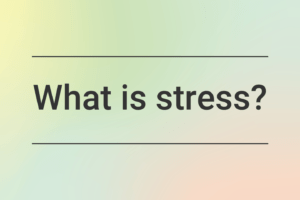Stress can have a profound impact on our mental and physical health, leading to anxiety, depression, fatigue, headaches, and even more serious issues. It is important to find ways to cope with stress to lead a healthier and happier life. Although there are many ways to manage stress, one of the most effective methods is through de-stress therapy. De-stress therapy is a form of psychotherapy that focuses on helping individuals reduce stress and improve their overall well-being. In this blog post, we will explore the different types of de-stress therapy available and how they can help you relieve stress and live a better life.
Contents
What Is Stress?

Stress is the body’s response to any demand, whether it be positive or negative. It is a mental and physical reaction to changes in our lives that cause us to feel overwhelmed or unable to cope with the situation. When we experience stress, our bodies prepare for a fight-or-flight response as hormones like adrenaline and cortisol are released into our bloodstream, causing our heart rate and blood pressure to rise, as well as increasing energy levels. Stress can be both short-term, lasting only a few minutes or days at a time, or long-term, persisting for weeks or months.
Short-term stress can cause feelings of anxiety and worry in the short term but is generally considered to be helpful and necessary for survival, as it helps us respond to threats. Long-term stress can be damaging both mentally and physically, leading to depression, fatigue weakened immunity, and other physical health problems.
What If Stress Is Left Untreated?

The impacts of stress can be severe and long-lasting if left untreated. It may lead to physical health problems like headaches and chest pain, as well as disruption to moods and emotions such as depression, anxiety, and irritability.
Long-term stress can also lead to more serious illnesses such as hypertension and cardiovascular disease if not addressed appropriately. Stress management can help prevent the physical and emotional breakdown associated with leaving it untreated.
Some other impacts of leaving stress untreated include:
- Poor decision-making: One of the most common symptoms of long-term stress is impaired decision-making. Having too much on one’s plate or feeling overwhelmed by tasks can lead to clouded judgment and poor decisions.
- Relationship problems: Without proper stress management, people may find it difficult to maintain healthy relationships with family, friends, and colleagues due to increased irritability or difficulty communicating.
- Sleep problems: Stress can lead to difficulty falling asleep, staying asleep, or waking up feeling unrested. This can impact not just one’s mental health but physical as well, leading to a decrease in energy levels and concentration during the day.
- Inability to focus: Long-term stress impairs one’s ability to focus, leading to a decrease in productivity and an inability to complete tasks. This can lead to even more stress as the person feels overwhelmed by the amount of work they need to do.
- Reduced work performance: An inability to focus and poor decision-making can lead to a decrease in work performance, which can have serious implications for an individual’s career. This type of stress-related workplace issue may cause further stress and anxiety if not addressed properly.
Different Types of De-Stress Therapy
There are many types of de-stress therapy available to help reduce stress. The type of therapy that is best for you will depend on your individual needs and personal preference. Some common types of de-stress therapy include:
Cognitive Behavioral Therapy (CBT)
CBT focuses on changing thought patterns and behavior to reduce stress levels. It’s based on the idea that our thoughts, emotions, and behaviors all affect each other. With CBT, you will work with a therapist to identify stress-causing thought patterns and replace them with more productive patterns.
CBT works by helping you to identify, understand and change the thought patterns and behaviors that are contributing to your stress.
Mindfulness-Based Stress Reduction (MBSR)
MBSR is a type of meditation that focuses on being mindful and paying attention to the present moment. Through this practice, you can learn how to become more aware of your thoughts, feelings, and physical sensations to better manage stress. This type of therapy also helps with emotional regulation and encourages self-care.
This type of de-stress therapy can be done as an individual or in a group setting.
Yoga and Other Physical Therapies
Yoga is a type of physical activity that combines movement, stretching, breathwork, and relaxation techniques to help manage stress. It can also help improve your posture, flexibility, and overall sense of well-being. Other types of physical activities, such as tai chi, walking and swimming can also help reduce stress.
These types of de-stress therapies are low impact and provide a great way to manage stress levels while getting exercise at the same time.
Talk Therapy
This type of therapy is focused on talking through your thoughts, feelings, and experiences to gain insight and gain a better understanding of yourself. Talk therapy can help you identify stress-causing thoughts and behaviors, as well as coping mechanisms for managing stress levels.
These types of de-stress therapies can be done with a therapist or in a group setting and can help you learn how to manage your emotions more effectively.
Exposure Therapy
One of the most popular forms of de-stress therapy is Exposure Therapy. This type of therapy helps individuals confront their fears and anxieties in a safe environment with the help of a therapist or counselor.
During exposure therapy, individuals are gradually exposed to the object or situation that causes them anxiety to learn how to cope with it and eventually overcome it. This type of therapy is particularly effective for those suffering from phobias, post-traumatic stress disorder (PTSD), and other anxiety disorders.
Which Type of Therapy Is Right For Me?

Choosing the right type of therapy to help relieve stress can be tricky. It is important to look at your situation and needs when selecting the best form of therapy for you.
Some of the factors that can help you decide which type of therapy to use are:
- Intensity of symptoms
One of the most important factors to consider when selecting a type of therapy is the intensity of your symptoms. Sometimes, people with more severe symptoms may need a more intensive form of therapy.
- Cost
Another important factor to consider when selecting a type of therapy is cost. Some therapies may be more expensive than others, so it is important to research different therapies and decide which one fits within your budget.
- Accessibility
It is also important to consider the accessibility of a particular type of therapy. Are there experienced professionals in your area who can offer the therapy you are looking for? Is the type of therapy available online or in person?
- Duration
Finally, it is important to consider the duration of a particular type of therapy. Some therapies may be more suitable for short-term or long-term use. It’s important to research different types of therapy and decide which one best fits your needs.
How Can I Find a Therapist?

The best way to find a therapist may vary depending on your individual needs and circumstances. However, here are a few general tips that may help you in your search:
- Ask for recommendations from people you trust. If you know someone who has seen a therapist before and had a positive experience, they may be able to point you in the right direction.
- Do some research online. Many websites allow you to search for therapists in your area, based on specific criteria (such as location, specialty, insurance coverage, etc.).
- Contact your insurance company. Many insurance plans cover therapy sessions, so it’s worth giving them a call to see what providers are in their network.
- Check with local mental health organizations or clinics. These types of organizations often have lists of recommended therapists in the community.
Conclusion
De-stress therapy can be an effective tool in helping you to reduce your stress levels and live a healthier life. There are many different types of therapies available, from cognitive behavioral therapy to mindfulness meditation, each with its own set of advantages and disadvantages. We hope that this article has helped you discover the right type of de-stress therapy for you so that you can start taking back control of your mental health today.
For more information, please contact MantraCare. Stress can have both physical and mental effects on the body, leading to negative consequences such as anxiety, depression, and even physical illnesses. If you have any queries regarding Online Stress Counseling experienced therapists at MantraCare can help: Book a trial Stress therapy session


